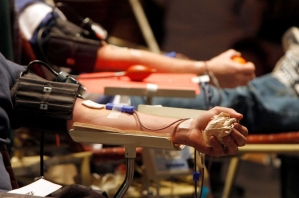
The Food and Drug Administration will consider changing a long-held policy that placed a lifetime ban on blood donations from gay and bisexual men.
According to a statement released by the FDA on Tuesday, the regulatory agency had "carefully considered the available scientific evidence" in regards to its blood donor policy for men who have sex with men. Matthew Perrone of the Associated Press reported that the change would put the United States in-line with other countries that have similar policies, such as Australia, Japan and the United Kingdom.
"The agency will take the necessary steps to recommend a change to the blood donor deferral period for men who have sex with men from indefinite deferral to one year since the last sexual contact," the FDA statement said.
Perrone noted that the FDA's lifetime ban dated from the early years of the AIDS crisis and had been intended to protect the nation's blood supply from HIV contamination, which was a little-known virus back then. Thanks to advances in standardized and routine HIV testing for donated blood, many medical groups, including the American Medical Association, think that the government agency's policy should be scrapped since the science no longer supported the ban.
Julie Zauzmer of the Washington Post reported that the FDA ban on blood donations by men who had sex with other men from 1977 to the present had been in force since 1983. The new FDA plan will allow gay men to donate blood after one year of abstaining from homosexual activity.
Dr. Peter Marks, deputy director of the FDA's Center for Biologics Evaluation and Research, told reporters via telephone on Tuesday that the FDA would draft the new guidelines in early 2015 and make revisions after opening them to public comments. He noted that the FDA study concluded that gay men can only donate blood after being abstinent for one year.
"At this time, the scientific evidence is not compelling that we can change to anything less than a one-year deferral and still maintain the current level of safety of the blood supply," Marks said.
Marks added that he could not put a timeline on the process, saying that "we commit to working as quickly as possible on this issue."
"We wouldn't recommend such a policy change if we didn't believe the scientific evidence supported that the safety of the blood supply would be maintained," Marks said.
According to current FDA guidelines as outlined in Washington Post, men and women of any sexual orientation cannot donate blood for one year if they had sex with an HIV-infected person, a commercial sex worker or intravenous drug user.
Based on government figures reported by the Associated Press, men who have had sex with other men represented about 2 percent of the U.S. population. However, that segment accounted for at least 62 percent of all new HIV infections in the United States.







